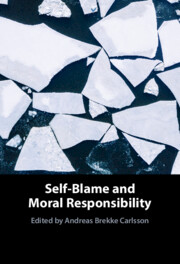Book contents
- Self-Blame and Moral Responsibility
- Self-Blame and Moral Responsibility
- Copyright page
- Contents
- Contributors
- Acknowledgments
- Introduction
- Part I The Nature of Self-Blame
- Chapter 1 The Motivational Theory of Guilt (and Its Implications for Responsibility)
- Chapter 2 The Trials and Tribulations of Tom Brady
- Chapter 3 A Comprehensive Account of Blame
- Chapter 4 A Forward-Looking Account of Self-Blame
- Part II The Ethics of Self-Blame
- Part III Self-Blame and Moral Responsibility
- References
- Index
Chapter 1 - The Motivational Theory of Guilt (and Its Implications for Responsibility)
from Part I - The Nature of Self-Blame
Published online by Cambridge University Press: 05 May 2022
- Self-Blame and Moral Responsibility
- Self-Blame and Moral Responsibility
- Copyright page
- Contents
- Contributors
- Acknowledgments
- Introduction
- Part I The Nature of Self-Blame
- Chapter 1 The Motivational Theory of Guilt (and Its Implications for Responsibility)
- Chapter 2 The Trials and Tribulations of Tom Brady
- Chapter 3 A Comprehensive Account of Blame
- Chapter 4 A Forward-Looking Account of Self-Blame
- Part II The Ethics of Self-Blame
- Part III Self-Blame and Moral Responsibility
- References
- Index
Summary
The Strawsonian approach to responsibility tries to explain what it is to be morally responsible for one’s actions in terms of being an appropriate object of the reactive attitudes. How informative such explanations can be depends in part on whether an adequate characterization of these attitudes can be given without appeal to the concept of responsibility itself. Guilt is the most promising candidate for a Strawsonian account of the first-personal case of holding oneself morally responsible. The question is whether guilt can be captured without appeal to responsibility or any similar concept. We argue that it can. This chapter offers a theory of guilt as a motivational state involving a goal and specific action tendencies that constitute direct and urgent means of meeting that goal. Despite its greater cognitive complexity, guilt is like simpler emotions such as anger and fear in how its goals and action tendencies are discontinuous with practical reasoning. The motivational theory of guilt provides an important tool for theorizing first-personal responsibility practices in Strawsonian terms. We go on to argue that, contrary to some influential scholarship, the appropriateness to which Strawsonians appeal should be the concept of fittingness rather than fairness or desert.
Information
- Type
- Chapter
- Information
- Self-Blame and Moral Responsibility , pp. 11 - 27Publisher: Cambridge University PressPrint publication year: 2022
Accessibility standard: Unknown
Why this information is here
This section outlines the accessibility features of this content - including support for screen readers, full keyboard navigation and high-contrast display options. This may not be relevant for you.Accessibility Information
- 7
- Cited by
